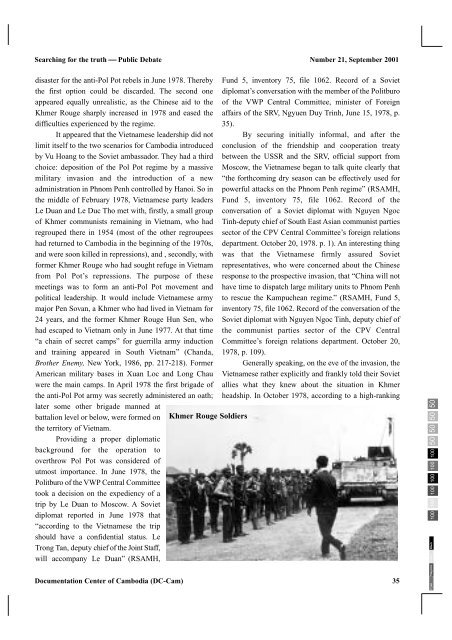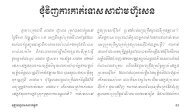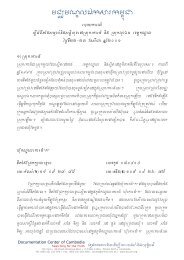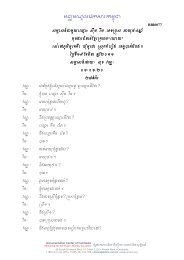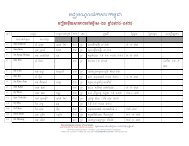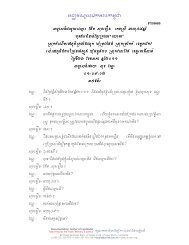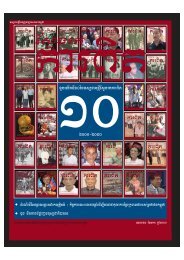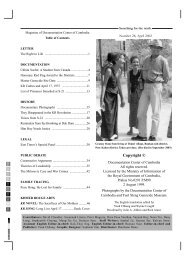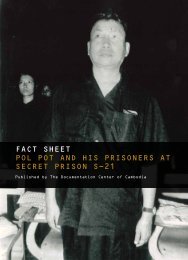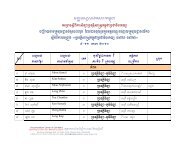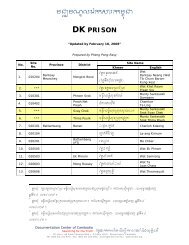Searching for the truth Issues 21 - Documentation Center of Cambodia
Searching for the truth Issues 21 - Documentation Center of Cambodia
Searching for the truth Issues 21 - Documentation Center of Cambodia
You also want an ePaper? Increase the reach of your titles
YUMPU automatically turns print PDFs into web optimized ePapers that Google loves.
<strong>Searching</strong> <strong>for</strong> <strong>the</strong> <strong>truth</strong> ⎯ Public Debate<br />
disaster <strong>for</strong> <strong>the</strong> anti-Pol Pot rebels in June 1978. Thereby<br />
<strong>the</strong> first option could be discarded. The second one<br />
appeared equally unrealistic, as <strong>the</strong> Chinese aid to <strong>the</strong><br />
Khmer Rouge sharply increased in 1978 and eased <strong>the</strong><br />
difficulties experienced by <strong>the</strong> regime.<br />
It appeared that <strong>the</strong> Vietnamese leadership did not<br />
limit itself to <strong>the</strong> two scenarios <strong>for</strong> <strong>Cambodia</strong> introduced<br />
by Vu Hoang to <strong>the</strong> Soviet ambassador. They had a third<br />
choice: deposition <strong>of</strong> <strong>the</strong> Pol Pot regime by a massive<br />
military invasion and <strong>the</strong> introduction <strong>of</strong> a new<br />
administration in Phnom Penh controlled by Hanoi. So in<br />
<strong>the</strong> middle <strong>of</strong> February 1978, Vietnamese party leaders<br />
Le Duan and Le Duc Tho met with, firstly, a small group<br />
<strong>of</strong> Khmer communists remaining in Vietnam, who had<br />
regrouped <strong>the</strong>re in 1954 (most <strong>of</strong> <strong>the</strong> o<strong>the</strong>r regroupees<br />
had returned to <strong>Cambodia</strong> in <strong>the</strong> beginning <strong>of</strong> <strong>the</strong> 1970s,<br />
and were soon killed in repressions), and , secondly, with<br />
<strong>for</strong>mer Khmer Rouge who had sought refuge in Vietnam<br />
from Pol Pot’s repressions. The purpose <strong>of</strong> <strong>the</strong>se<br />
meetings was to <strong>for</strong>m an anti-Pol Pot movement and<br />
political leadership. It would include Vietnamese army<br />
major Pen Sovan, a Khmer who had lived in Vietnam <strong>for</strong><br />
24 years, and <strong>the</strong> <strong>for</strong>mer Khmer Rouge Hun Sen, who<br />
had escaped to Vietnam only in June 1977. At that time<br />
“a chain <strong>of</strong> secret camps” <strong>for</strong> guerrilla army induction<br />
and training appeared in South Vietnam” (Chanda,<br />
Bro<strong>the</strong>r Enemy, New York, 1986, pp. <strong>21</strong>7-<strong>21</strong>8). Former<br />
American military bases in Xuan Loc and Long Chau<br />
were <strong>the</strong> main camps. In April 1978 <strong>the</strong> first brigade <strong>of</strong><br />
<strong>the</strong> anti-Pol Pot army was secretly administered an oath;<br />
later some o<strong>the</strong>r brigade manned at<br />
battalion level or below, were <strong>for</strong>med on<br />
<strong>the</strong> territory <strong>of</strong> Vietnam.<br />
Providing a proper diplomatic<br />
background <strong>for</strong> <strong>the</strong> operation to<br />
overthrow Pol Pot was considered <strong>of</strong><br />
utmost importance. In June 1978, <strong>the</strong><br />
Politburo <strong>of</strong> <strong>the</strong> VWP Central Committee<br />
took a decision on <strong>the</strong> expediency <strong>of</strong> a<br />
trip by Le Duan to Moscow. A Soviet<br />
diplomat reported in June 1978 that<br />
“according to <strong>the</strong> Vietnamese <strong>the</strong> trip<br />
should have a confidential status. Le<br />
Trong Tan, deputy chief <strong>of</strong> <strong>the</strong> Joint Staff,<br />
will accompany Le Duan” (RSAMH,<br />
<strong>Documentation</strong> <strong>Center</strong> <strong>of</strong> <strong>Cambodia</strong> (DC-Cam)<br />
Khmer Rouge Soldiers<br />
Number <strong>21</strong>, September 2001<br />
Fund 5, inventory 75, file 1062. Record <strong>of</strong> a Soviet<br />
diplomat’s conversation with <strong>the</strong> member <strong>of</strong> <strong>the</strong> Politburo<br />
<strong>of</strong> <strong>the</strong> VWP Central Committee, minister <strong>of</strong> Foreign<br />
affairs <strong>of</strong> <strong>the</strong> SRV, Ngyuen Duy Trinh, June 15, 1978, p.<br />
35).<br />
By securing initially in<strong>for</strong>mal, and after <strong>the</strong><br />
conclusion <strong>of</strong> <strong>the</strong> friendship and cooperation treaty<br />
between <strong>the</strong> USSR and <strong>the</strong> SRV, <strong>of</strong>ficial support from<br />
Moscow, <strong>the</strong> Vietnamese began to talk quite clearly that<br />
“<strong>the</strong> <strong>for</strong>thcoming dry season can be effectively used <strong>for</strong><br />
powerful attacks on <strong>the</strong> Phnom Penh regime” (RSAMH,<br />
Fund 5, inventory 75, file 1062. Record <strong>of</strong> <strong>the</strong><br />
conversation <strong>of</strong> a Soviet diplomat with Nguyen Ngoc<br />
Tinh-deputy chief <strong>of</strong> South East Asian communist parties<br />
sector <strong>of</strong> <strong>the</strong> CPV Central Committee’s <strong>for</strong>eign relations<br />
department. October 20, 1978. p. 1). An interesting thing<br />
was that <strong>the</strong> Vietnamese firmly assured Soviet<br />
representatives, who were concerned about <strong>the</strong> Chinese<br />
response to <strong>the</strong> prospective invasion, that “China will not<br />
have time to dispatch large military units to Phnom Penh<br />
to rescue <strong>the</strong> Kampuchean regime.” (RSAMH, Fund 5,<br />
inventory 75, file 1062. Record <strong>of</strong> <strong>the</strong> conversation <strong>of</strong> <strong>the</strong><br />
Soviet diplomat with Nguyen Ngoc Tinh, deputy chief <strong>of</strong><br />
<strong>the</strong> communist parties sector <strong>of</strong> <strong>the</strong> CPV Central<br />
Committee’s <strong>for</strong>eign relations department. October 20,<br />
1978, p. 109).<br />
Generally speaking, on <strong>the</strong> eve <strong>of</strong> <strong>the</strong> invasion, <strong>the</strong><br />
Vietnamese ra<strong>the</strong>r explicitly and frankly told <strong>the</strong>ir Soviet<br />
allies what <strong>the</strong>y knew about <strong>the</strong> situation in Khmer<br />
headship. In October 1978, according to a high-ranking<br />
35<br />
100 100 100 100 100 100 50 50 50 50<br />
Black<br />
Yellow<br />
Magenta<br />
Cyan


